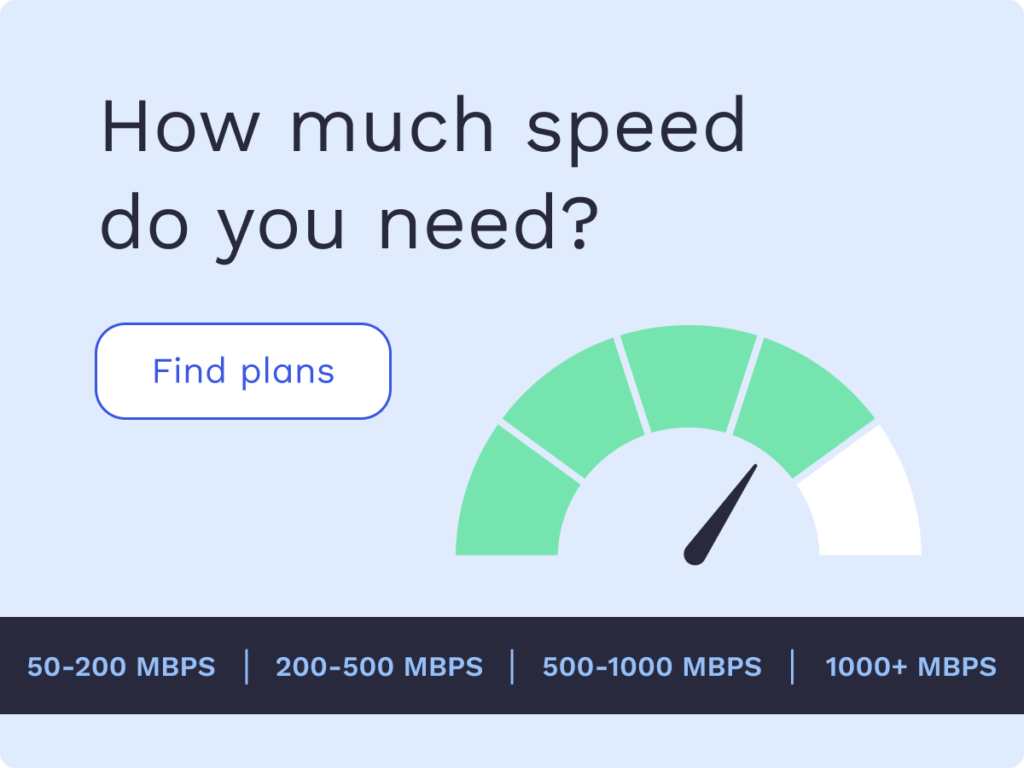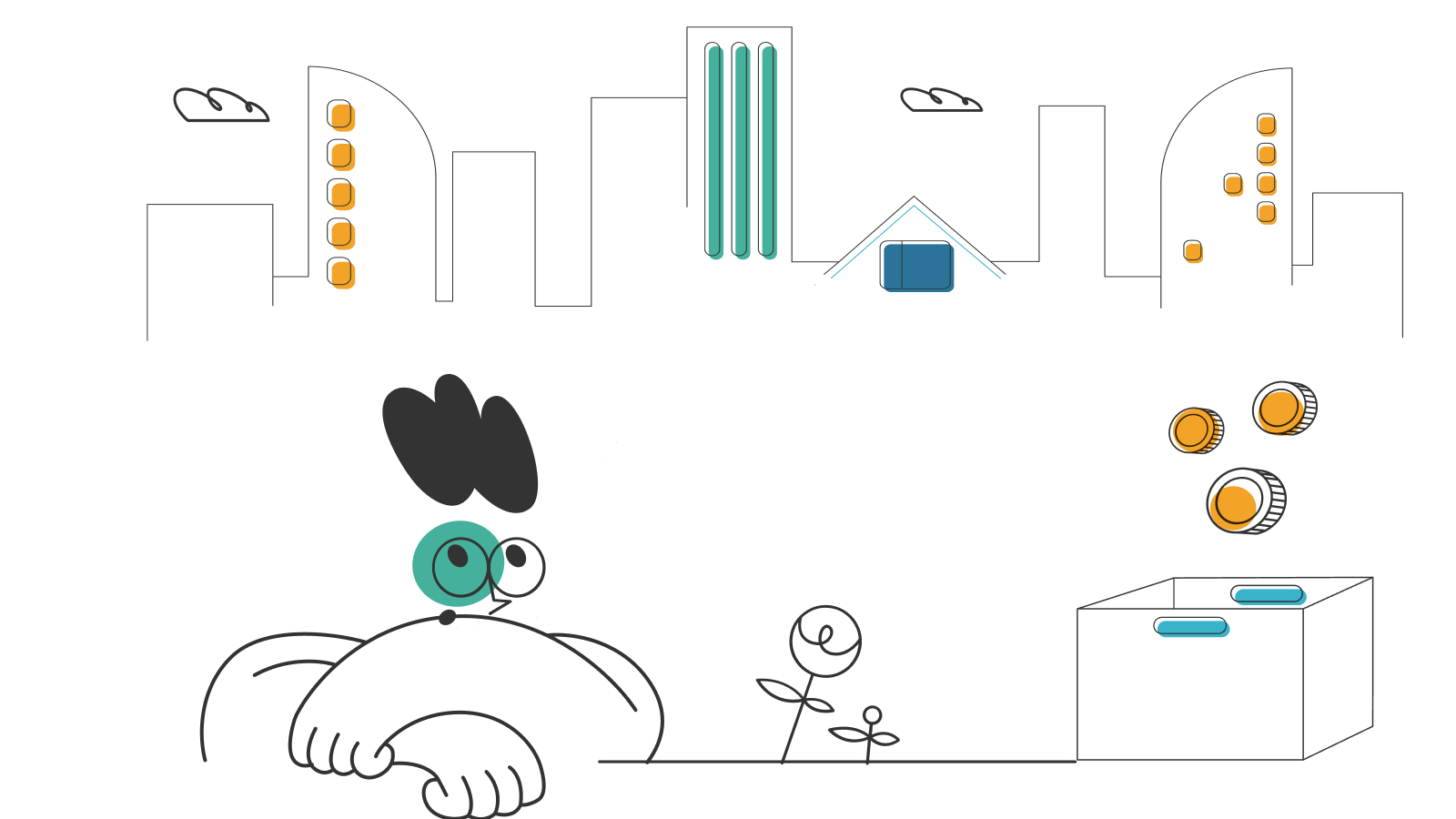Fixed Wireless vs Mobile Broadband Internet

Thinking about getting internet service for your home, but not sure whether to select fixed wireless or mobile broadband?
Although fixed wireless and mobile internet look similar and function in much the same way, both technologies differ in small yet important ways. Most notably, fixed wireless is stationary, while mobile broadband is a better choice for getting internet service on the go. To help you make the right choice, we’ve summed up what each of these connections has to offer.
- What is fixed wireless internet?
- Who provides fixed wireless internet service?
- What is mobile broadband internet?
- Who provides mobile broadband internet?
- Comparing fixed wireless vs mobile broadband
- Frequently asked questions (FAQs)
What is fixed wireless internet?
Fixed wireless internet connections rely on radio waves broadcasted from towers to receivers installed on the user’s property. It’s also called a point-to-point link and Fixed Wireless Access (FWA) internet connection as it eliminates dependence on cable or phone lines. It even works seamlessly in areas with no cellular service. Fixed wireless is also an affordable way to share a single connection with another household.
This type of connection is usually more stable than mobile wireless, which uses radio towers that can be adversely affected by weather, interference from other towers, and changes in consumer usage. Weather won’t have an extreme effect on fixed wireless connections if they are installed correctly. Fixed wireless can be used in areas with limited access to cable or fiber connections while still providing the same high-speed internet services.
Fixed wireless connections depend on small stations to transfer data at high speeds. As the stations are clustered together, fixed wireless connections deliver internet speeds much faster than than 4G with lower latency.
Who provides fixed wireless internet service?
AT&T
AT&T currently offers internet service across 21 states. Its fixed wireless internet provides high-speed service to eligible rural households that cannot get traditional AT&T internet service. AT&T fixed wireless internet supports standard internet activities, including streaming HD video and music, online gaming, social media, web surfing, and email.
Speed
You can expect speeds of at least 10Mbps download and 1Mbps upload.
Starry
Starry is a fixed wireless internet provider that relies on mmWave technology. The company is using a market disruptive IEEE 802.11-based technology and 24GHz and 37GHz millimeter wave spectrum. This type of tech promises intensely fast internet speed. The only downside is that Starry currently covers seven states, but the company has expansion plans for other states that could increase its user base to over 40 million households across the US.
Speed
The maximum download and upload speed for Starry is up to 200Mbps.
Rise Broadband
Rise Broadband is another option for households looking for fixed wireless internet. Service is currently available in 16 states, with the highest coverage in Texas, Illinois, and Colorado. One thing to note is that pricing is somewhat higher than other ISPs, and Rise Broadband charges an unavoidable $11 monthly equipment fee.
Speed
Rise Broadband offers speeds of up to 50Mbps.
T-Mobile Home Internet
T-Mobile fixed wireless internet is available nationwide and offers the fastest speeds, winning Opensignal’s award for 5G Download Speed in 2021.
Speed
T-Mobile Home Internet customers can typically see download speeds between 35 and 115Mbps. Speeds vary depending on location, signal strength and availability, time of day, and other factors.
Verizon LTE Home Internet
Verizon LTE Home Internet offers fixed wireless plans with no data caps or annual contracts. The award-winning network offers coverage in most states. It costs $50/month when you use auto pay and paper-free billing. This price includes taxes, fees, and a Wi-Fi 6 enabled LTE router.
How to set up internet
Verizon LTE Home Internet has download speeds of 25 to 50Mbps. Typical upload speeds are of 4Mbps, with no data usage caps.
What is mobile broadband internet?
Mobile broadband relies on a cellular network to provide internet access to devices like smartphones and tablets. It’s an adequate substitute for broadband connections (like DSL or cable) and is an alternative to traditional cellular phone service.
This type of wireless internet connection relies on a router that resembles the one you might have at home, but it utilizes a small rechargeable battery that powers the device. The addition of the battery makes the router portable, making it easy for those who require internet on the go.
The router will also have a data SIM card inside that connects to the same 4G or 5G network. It can broadcast the signals as a Wi-Fi connection that other devices can detect and connect to.
Mobile broadband dongles are handy for high-speed portable internet while you’re on the move. These dongles are like a plug-n-play USB stick used on a device with a USB port. It’s important to note that most of these portable routers can only allow one to three devices to connect. Plus, it’s likely to drain the phone or laptop battery quickly as it’s powered by the device’s internal battery.
Who provides mobile broadband internet service?
Mobile wireless internet is an easy way to get online because you don’t have to wait for the installation of cables and networking equipment. Plus, it doesn’t require you to be in one place for long. Now the big question is: which internet provider offers reliable service? Here’s a list of some of the most reliable mobile broadband internet service providers.
AT&T
AT&T has one of the most extensive cellular services in the US, and offers mobile broadband internet along with other internet services. AT&T Wireless operates a vast network across the US, and its broadband coverage is spread across all states and major cities and towns. The company rolled out 5G in 38 states, but expansion plans are in motion for more coverage.
Speed
The speed ranges from 3 to 120Mbps, whereas the upload range is between 0.3 and 23Mbps.
Verizon
Verizon offers mobile broadband internet service for smartphones, tablets, netbooks, USB or fixed modems, mobile hotspots, smartwatches, connected cars, and other wireless devices over its 5G Ultra-Wideband, 5G Nationwide, 4G LTE, or 3G Ev-DO broadband networks.
Speed
Typical download speeds range from 90 to 170Mbps and speeds over 1Gbps are available in certain areas.
T-Mobile
T-Mobile offers mobile broadband internet service for smartphones, basic phones, tablets, netbooks, USB modems, mobile hotspot devices, and other wireless devices over its 2G, 3G, 4G, and 5G broadband networks.
Speed
If you wish to stream movies, play music, browse the internet or watch videos in HD, then T-Mobile’s download speeds of 19 to 10Mbps will suffice. The upload speed is 1Mbps on average.
Cricket Wireless
Cricket Wireless offers mobile broadband service in 37 states, covering a mixed footprint that includes 3G, 4G, and LTE services. Cricket has a shared network, which means that subscribers share transmission links and other network resources are used to provide broadband services.
Speed
Cricket Wireless mobile broadband has download speeds of up to 6Mbps, which is enough to keep you connected while you’re on the move.
Comparing fixed wireless vs mobile broadband
While both fixed wireless and mobile broadband are wire-free internet solutions, they have some differences. We’ll look at the main differences to help you choose which one could be your best option for internet service.
Portability
Mobile broadband offers better portability. With a separate battery-operated router, mobile broadband is the most suitable service for using the internet on the move. It uses the same cellular networks as your phone, allowing you to get more coverage on the go compared to fixed wireless internet connections.
On the other hand, fixed wireless is stationary. The receiver/router will be installed directly on your property, which means you have high-speed internet at home, but you can’t enjoy the connectivity if you’re on the move.
Latency
Latency refers to the time it takes for an internet signal to travel from the transmitter to your device and back. Lower latency can result in higher-speed internet. Fixed wireless internet offers low latency due to its point-to-point connection. On the other hand, mobile wireless internet has higher latency because the signal goes from one cell tower to another, increasing the distance and time it takes for data to be transferred back and forth.
Bandwidth
Fixed wireless internet has higher bandwidth due to low latency. Fixed wireless connections are limited to the building where they are installed, and since the number of users per connection is limited, this results in comparatively higher bandwidth. In contrast, mobile broadband has lower bandwidth as the network tower is shared with a lot of other users in the same area.
Speed
Fixed wireless is usually much faster than mobile broadband services. However, it is limited to densely populated areas because it requires line-of-sight connectivity. With fixed wireless, you can expect speeds of at least 40Mbps, with some providers offering speeds of up to 1000Mbps.
On the other hand, the average mobile broadband download speed on 4G is 15Mbps and on 5G it is 47 to 58Mbps. Although some mobile broadband providers may tout unlimited data, they can throttle your connection once you reach a certain limit, slowing down your internet speed.
Frequently asked questions (FAQs)
Which is cheaper: fixed wireless or mobile broadband internet?
In terms of price, mobile broadband is almost three times cheaper than fixed wireless internet. With mobile wireless broadband, you don’t have to pay for additional equipment, installation, and other charges that fixed wireless internet may incur. Mobile data packages are also more affordable in some areas as compared to fixed ones.
Which offers higher speed internet: fixed wireless or mobile broadband?
Both mobile broadband and fixed wireless are high-speed internet options, but fixed wireless is faster. That is because fixed wireless has lower latency and higher bandwidth.
Is fixed wireless the same as satellite internet?
No, a fixed wireless connection is completely different from satellite internet. With satellite, the distribution point is a satellite that’s orbiting the Earth about 22,000 miles away. In fixed wireless, the distribution point is typically a cell tower within ten or so miles from your access point.
*Pricing varies by location and availability. Speeds may vary. All prices subject to change; for current pricing and availability visit our internet service page. Prices as of 5/23/22.
Disclosure | Updater articles are based on our own data and research, independent from partner relationships. We are not compensated by partners for information and opinions presented here. Our Editorial Terms of Service can be found here.














